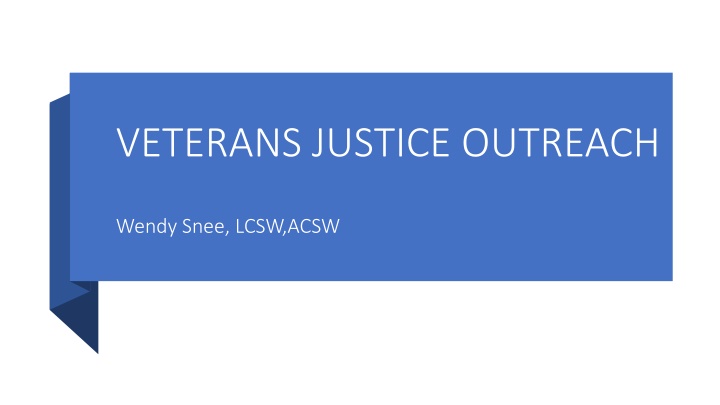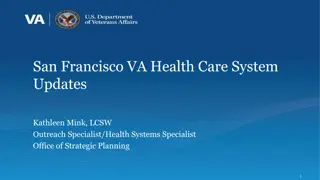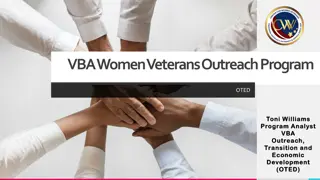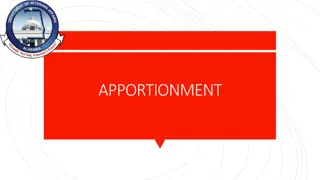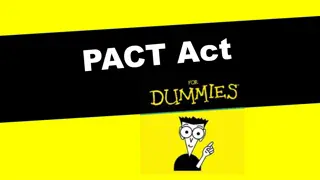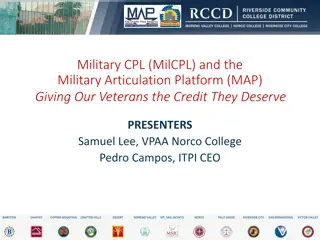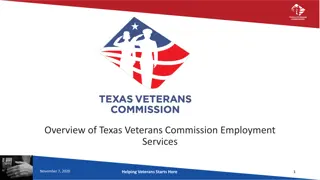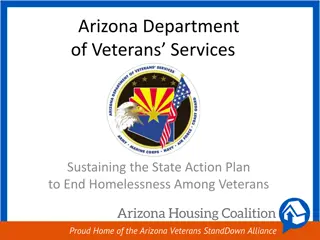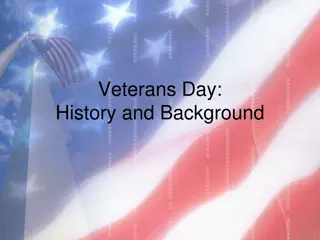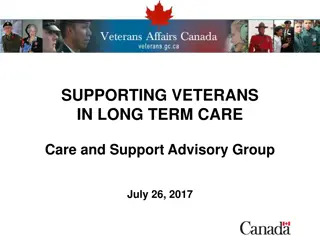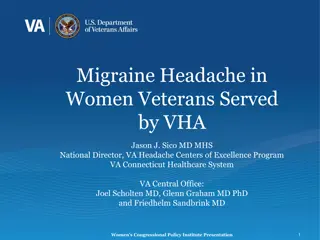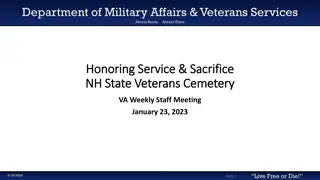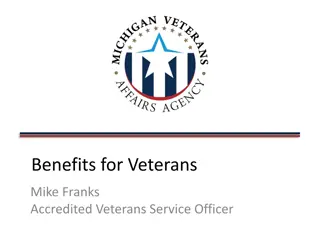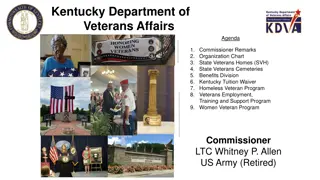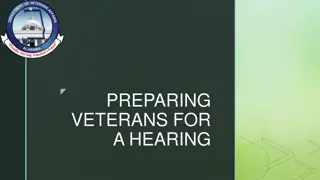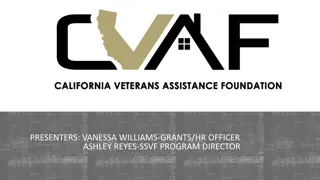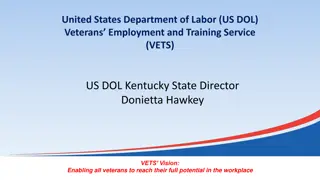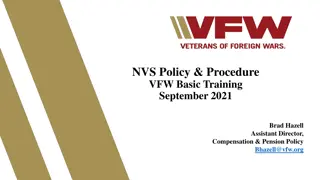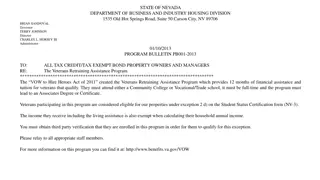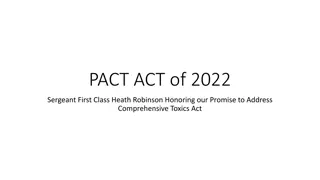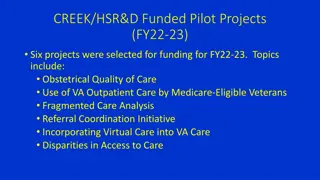VETERANS JUSTICE OUTREACH
The Veterans Justice Outreach program aims to support justice-involved veterans by providing outreach and access to VA services. It addresses the unique needs of veterans in the criminal justice system, offering assistance with reentry, mental health, substance abuse, and more. Through collaboration with community partners, the program strives to reduce recidivism and promote successful reintegration into society.
Download Presentation

Please find below an Image/Link to download the presentation.
The content on the website is provided AS IS for your information and personal use only. It may not be sold, licensed, or shared on other websites without obtaining consent from the author.If you encounter any issues during the download, it is possible that the publisher has removed the file from their server.
You are allowed to download the files provided on this website for personal or commercial use, subject to the condition that they are used lawfully. All files are the property of their respective owners.
The content on the website is provided AS IS for your information and personal use only. It may not be sold, licensed, or shared on other websites without obtaining consent from the author.
E N D
Presentation Transcript
VETERANS JUSTICE OUTREACH Wendy Snee, LCSW,ACSW
JUSTICE INVOLVED JUSTICE INVOLVED VETERAN FACTS VETERAN FACTS On Any Given Day Veterans Comprise: 8.8% of the US adult population 8.4% of the total prison population 6.7% of the total jail population
Current offense, sentencing, and criminal history characteristics of male inmates in prison, by veteran status, 2011 12 Percent of male prisoners Estimated number of male prisonersNonveterans Veterans Nonveterans Veterans* 123,600 1,153,900 100% 43,700 168,000 35.4 35,700 382,500 28.9 14,500 199,500 11.7 17,500 268,100 14.2 3,500 31,800 2.8 8,700 104,100 7.0 128,800 1,201,700 100% 2,500 41,200 1.9 22,200 297,300 17.2 54,200 535,300 42.1 28,700 211,400 22.3 21,100 114,600 16.4 200 1,900 0.1 128,900 1,201,800 100% 28,100 173,400 21.8 45,000 365,000 34.9 36,900 437,700 28.6 18,900 225,700 14.6 130,100 1,213,100 100% 95,400 972,600 73.3 34,700 240,500 26.7 Note: Detail may not sum to total due to rounding and missing data. Nonveterans were standardized to veterans for age, race, and Hispanic origin for male prison inmates. See appendix table 5 for standard errors. *Comparison group. **Difference with the comparison group is significant at the 95% confidence level. aIncludes prison, jail, or any other correctional facility. Source: Bureau of Justice Statistics, National Inmate Survey, 2011-12. MOST SERIOUS OFFENSE VIOLENT SEXUAL OTHER VIOLENT PROPERTY DRUG DUI/DWI OTHER SENTENCE LENGTH LESS THAN 1 YEAR 1 4 YEARS 5 19 YEARS 20 YEARS OR MORE LIFE SENTENCE DEATH SENTENCE NUMBER OF PRIOR ARRESTS 1 2 3 4 10 11 or more PRIOR INCARCERATION* Yes No Standardized 100% 23.3** 28.9 17.2** 19.3** 4.1** 7.1 100% 2.5 20.6** 40.0 22.8 13.9** 0.2 100% 15.7** 29.2** 34.8** 20.3** 100% 77.5** 22.5** Unstandardized 100% 14.6** 33.1** 17.3** 23.2** 2.8 9.0** 100% 3.4** 24.7** 44.5 17.6** 9.5** 0.2 100% 14.4** 30.4** 36.4** 18.8** 100% 80.2** 19.8**
FREQUENTLY USED TERMS FREQUENTLY USED TERMS PTI Pretrial Intervention Contractual agreement between the state and defendant where charges can be deferred and dismissed provided defendant agrees to complete certain sanctions and special conditions. Misdemeanor cases and 1st time offenders. Short process generally 4 6 months to complete conditions. Pretrial Diversion Deferred prosecution program for certain felony charges, misdemeanors, some DUI charges is offered by the State Attorney Office (SAO). Successful completion of the Pretrial Diversion program typically results in the dismissal of the case by the SAO. The State Attorney Office is the only office that can refer someone for diversion. Generally, much longer than PTI, 12+ months, requires treatment, monitoring, and adhering to the structure of the program. Not eligible Felonies involving a weapon and extreme violence, domestic violence cases involving a firearm or weapon, cases involving sexual allegations. Probation A form of community supervision. It is an alternative to incarceration (may be used for sentencing if probation requirements not obeyed), includes a period of formal supervision that must be served with strict adherence to stringent terms and conditions. It is available in both county (misdemeanor) and circuit (felony) courts and comes in the following varieties: Administrative (a/k/a "non-reporting"), Reporting (a/k/a "paper"), Drug Offender (a/k/a "urinalysis & AA"), Sex Offender and Community Control (a/k/a "house arrest").
Violation of Probation - The procedure for a violation of probation ("VOP") requires that a probation officer ("PO") have reasonable grounds to believe that a material term of probation was violated. A PO can make a warrantless arrest or prepare a sworn document (an affidavit) to present to a Judge. The Judge will review the document, and if satisfied, then a warrant will be issued. Probation warrants almost universally have a no-bond hold, so if one is issued it is likely that defendant will be spending some time in custody. If a warrant is issued there are two options: 1) wait for warrant to be served or 2) arrange to self-surrender. The latter permits argument to the court that defendant is responsible and respects the court s authority which could be the difference in securing a probation bond and being released. Community Control (CC) Intensive supervised custody in the community. It is an individualized program. The freedom of an offender is severely restricted and specific sanctions are imposed and enforced. Also known as "house arrest" - this is the strictest form of community supervision. The terms and conditions of CC are separate and distinct from those of straight probation and are significantly more restrictive and tightly enforced. CC has an incredibly high failure rate. There is "zero tolerance" for violations. Generally monitored by ankle monitor and base station at place of residence. FREQUENTLY FREQUENTLY USED TERMS USED TERMS CONTINUED CONTINUED
VETERANS JUSTICE OUTREACH PROGRAM VETERANS JUSTICE OUTREACH PROGRAM Each VA medical center has a VJO Specialist who serves as a liaison between VA and the local criminal justice system. The goal of the program is to provide timely access to VA services for eligible Veterans, preventing homelessness and avoiding unnecessary criminalization, while providing routes to mental health and other clinical treatment aimed toward a lasting rehabilitation and independence for the involved Veterans. http://www.va.gov/HOMELESS/VJO.asp. What is a Veterans Treatment Court? - YouTube
May assist in eligibility determination and enrollment, function as members of court treatment teams, use evidence-based interventions appropriate for the justice- involved Veteran population (e.g., Motivational Interviewing, CBT, CPT, etc.). May provide or coordinate training for law enforcement personnel on Veteran-specific issues including Post Traumatic Stress Disorder (PTSD), Traumatic Brain Injury (TBI), Suicide Prevention, and Veterans Treatment Courts. Refer and link Veterans to appropriate VA and non-VA community services. Support of ancillary needs of justice involved Veterans (e.g. child support, civil legal, financial stability, and benefits). VJO RESPONSIBILITIES VJO RESPONSIBILITIES Direct outreach Assessment VJO is a licensed, independent practitioner. Case management for justice- involved Veterans in local courts and jails, and liaison with local justice system partners.
VETERANS TREATMENT COURTS VETERANS TREATMENT COURTS Hybrid Drug and Mental Health Courts using the Drug Court model serving Veterans struggling with addiction, serious mental illness, TBI, and/or co- occurring disorders. Promotion of sobriety, recovery and stability through a coordinated response that involves cooperation and collaboration with VA medical centers, the Veterans Benefits Administration, volunteer Veteran mentors, and Veterans family support organizations. https://www.youtube.com/watch?v=TZTGKq6_lEE https://www.youtube.com/watch?v=53tqlfU4LF0
10 KEY COMPONENTS OF VETERANS TREATMENT COURTS 10 KEY COMPONENTS OF VETERANS TREATMENT COURTS Integration of alcohol, drug treatment, and mental health services into justice system case processing Early identification of eligible participants Continuum of services holistic approach Non-adversarial approach Coordinated strategy for responses to clients participation reward cooperation, responses/sanctions for noncompliance Abstinence is monitored by frequent alcohol and drug testing Ongoing judicial interaction by the judge Monitoring and evaluation for program effectiveness Interdisciplinary education all VTC staff should be engaged in education and training across the disciplines and services Partnerships with stakeholders with public agencies and community providers Justice for Vets (a division of the National Association of Drug Court Professionals)
VTC LOCATIONS 31 Veterans Treatment Courts in Florida (as of Feb 2021). Four are operating as a part of drug court and/or mental health court. Data from 2016 indicates that Florida s veterans courts admitted approximately 11,100 participants and graduated 640. There are 407+ VTCs across the U.S (as of April 2020).
Any person who served in the active military, naval, or air service regardless of character of discharge. ELIGIBILITY CRITERIA IN FLORIDA Any current servicemember - which means any person serving as a member of the United States Armed Forces on active duty or state active duty and all members of the Florida National Guard and United States Reserve Forces. Any current or Former DoD Contractor Current or Former Members of an allied military force who suffer from PTSD, TBI (traumatic brain injury), SUD (substance use disorder) or mental health disorder
Referrals from jails, courts, providers, attorneys, family members, or self-referral Veterans attorney and the state attorney must agree on terms of entrance A veteran s participation in the program is dependent upon the approval of the State Attorney Office prior at the discretion of the judge Diversion or Pre-trial intervention (PTI) Judge monitors the contract after signing State will announce nolle prosequi upon completion- all charges dismissed Plea Bargain or Post Plea VTC is ordered as part of sentencing charges are not generally dismissed in these cases. How to Enter?
General Demographics: Age, race, ethnicity, marital status, children under 18 years of age, level of consciousness (A&Ox4), arrest date, charges and next court date. Reasons why VTC would be a benefit. A S S E S S M E N T Military History: Branch, years served, rank, MOS, service-connected disabilities and information pertaining to separation, current housing situation, employment pattern, and educational level. Substance Abuse History: Emphasis is placed on time in the military up to current (court is focused on this period), alcohol and substance use while in the military, pattern of use from enlistment to present, any ARIs while in the military. Professional treatment for SUD where, when. Mental Health and Determination if sx of PTSD mental health hx (if any from enlistment to current. if yes, issues that contributed to possible PTSD, including MST and other traumatic events (physical, sexual, and/or emotional). Any professional treatment for SUD or MH issues including inpatient hospitalizations where and when. Medications, firearms, support system. Also, full psychiatric evaluation with diagnosis. Assessment is from the perspective of the veteran. often issues are self-diagnosed. VJO has access to all VA medical records and DOD medical records, DPRIS (Defense Personnel Records Information Retrieval System). VJO is not an investigator but will attempt to confirm concerns if needed. Veteran signs release for access to medical records and ongoing communication with the court.
VA SERVICES MENTAL HEALTH Outpatient: Individual & group settings Anger Regulation, Strength at Home - designed to prevent and end intimate partner violence (IPV) among military veterans, CBT Skills Group, LGBTQ and Transgender Support Groups, Mindfulness, MST Support Groups, P.A.W.S Panic, Anxiety, Worry, and Stress, Parenting Skills Group, Couples Communication Group, Schizophrenia/Schizoaffective Support Group, Women Veterans MH Group, Whole Health (9-12 weeks), Depression Skills Group, PCT Post Traumatic Stress Disorder Clinic (must be diagnosed by licensed independent provider prior to referral), Peer Support Groups, Wellness Recovery Action Plan, Money Management, Suicide Prevention, etc. Inpatient: Includes individual & groups Acute care and PRRTP - Psychosocial Residential Rehabilitation Tx Program (substance abuse and serious MH disorder) and SARTP Substance Abuse Residential Treatment Program Both PRRTP and SARTP will not accept a patient referred from the legal system into a residential RRTP without written assurance from the court system that the PRRTP Clinical Team has full authority for all treatment decisions regarding the patient. Psychiatric/Med Management Mental Health - Intensive Case Management (MHICM) Severe and persistent mental illness such as Schizophrenia, Schizoaffective Disorder, Bipolar Disorder; severe functional impairment with 30 or more inpatients days or three admissions in the past 12 months on acute psychiatric unit.
VA SERVICES SUBSTANCE USE DISORDER SARTP Substance Abuse Residential Treatment Program Lake City SATT Substance Abuse Treatment Team Multiple locations Initial Assessment for alcohol, drugs and nicotine abuse Outpatient Counseling, including Motivational Interviewing, CBT and Psychoeducational Groups. Intensive Case Management, including referrals where needed to other VA and/or Community Services such as: HCHV, PTSD, VOC REHAB, Couples Counseling, MST, Grief Groups, 12 Step Programs. Detoxification - Inpatient medically managed at Gainesville VA Medical Center or Community Non-VA Providers Partial Hospitalization Treatment (PHP) referral to Community Non-VA Providers Intensive Outpatient Treatment (IOP) at JAX SATT IOP or referral to Community Non-VA Providers ( including providers that offer Evening Hours Programs or Programs offering transportation) Psychiatric and Medication Management Services Monitoring of daily assessment of withdrawal symptoms, breathalyzer evaluation, on-site urine collection for lab testing, or lab orders for JOPC Buprenorphine Clinic: Referral for Inpatient Buprenorphine Induction or Outpatient Buprenorphine Induction where clinically appropriate followed by weekly Buprenorphine group and psychiatric/medication monitoring Methadone Treatment - Referrals to Community Non-VA Provider Referrals to Residential Treatment Services: VA Resources or referral to Community Non-VA Providers Individual and group therapies Relapse Prevention, Motivational Enhancement, Early Recovery, Recovery Skills, Seeking Safety, Anger Management, Peer Support Psychological Services Social Work Services
VA SERVICES VA SERVICES HOUSING Community Resources and Referral Center (CRRC) HUD VASH - GPD Grant and Per Diem - awards grants to community-based agencies that provide transitional housing and supportive services for homeless Veterans. VA provides per diem payments to non- profit organizations to help offset the operational costs of these programs. Volunteers of America (Bridge, 90 days), Clara White Mission (Bridge, 90 days), Clara White Boulevard House (females, bridge, 90 days) HCHV Contract Residential Service (CRS) - Sulzbacher (Men); Sulzbacher Village (Women); Sulzbacher Family Dorm (All 90 days) Honor Center Gainesville - Mental Health Residential - Rehabilitation Treatment Program Affordable Housing Resources Referrals to Five Star and other community resources, assistance with housing options for sex offenders
HOW MENTORS CAN HELP 5,700 volunteer as Veteran Mentors (VM) in VTCs a unique role Willing listener Encouraging and supportive Tolerant and respectful of individual differences Become knowledgeable of community resources -the justice-involved veteran with community partners. These include housing officials, transportation, employment, faith-based organizations, family services, and government assistance. Motivate participants utilizing a strengths-based approach by highlighting the strengths, talents, skills and knowledge of the veteran Privacy and Confidentiality what you hear from the court team and what you hear from your mentee Maintain appropriate boundaries remember you are not their personal assistant Empower your mentee to engage with services with them as the lead. Assist in getting access to My HealtheVet, encourage scheduling of primary care visits (vet becomes vested in system, must be seen 1x/yr.), Remember you are not their counselor you are advocating for your client to navigate the systems Problem-solve existing issues and bring to the attention of the Court any issues that the Court can assist in resolving Please have veteran contact VJO to assist with all aspects of their VA care. This does not mean their service-connected issues with VBA
